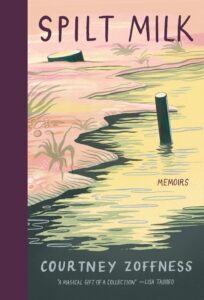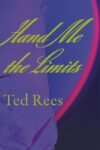
[McSweeney’s; 2021]
Empathy, that calling card of empty both-sides-isms and preening profiles about that “real American,” the white working-class voter in the diner in the “middle” of the country — we’re right to be wary. There’s a cheapening of the language of empathy today that makes cynics of us all, a way in which the concept of empathy is utilized such that, at best, it becomes nothing more than the medium of a meaningless thought exercise, and at worst makes empathy a cynical manifestation of power, a tool used by those in power to appear to understand without requiring meaningful action or provoking meaningful change. In her imaginative Spilt Milk, Courtney Zoffness strives toward empathy in a way that pushes against the cynicism we’re justified in feeling upon the trotting out of the concept.
What more appropriate place to start in 2021 than an essay about cops? “Boy in Blue” tells the story of Zoffness’s four-year-old son Leo and his admiration of the NYPD, his idolization of cops and desire to become one. We watch as Zoffness stumbles through teaching her boys about the inequities and brutalities of American policing, how to teach such things to a young white boy obsessed with the police he sees every day on his precinct-adjacent block.
One Saturday morning, four-year-old Leo, dressed in his cop outfit, arrests his mom. (“You’re unarrested,” he tells her, “his misunderstanding of under arrest”):
I saw you stealing, he says, voice rugged with faux fury. Why did you steal?
I’m sorry, Officer, I say. I lost my job and my children were hungry. I needed money to feed them.
He is quiet. Unmoved by my oversimplification, maybe. Your kids are hungry? he says.
I nod.
Why didn’t you just ask me for money?
You?
Yes! I have tons of money. I’m a police officer. Here, take some. He puts his hand in mine. Invisible currency. Take it, he says. You’re free to go.
Zoffness and Leo together imagine a world better than the one we live in — a world, indeed, where a cop might give money to the desperate mom instead of arresting her, perhaps while making the arrest wishing things were different for that mother but not seeing himself as someone with agency to help in that moment, or with an obligation to do so. Zoffness goes on to tell her son about the time she was arrested, and the layers of privilege that resulted in the arrest being expunged from her record. Throughout the essay, she lays the landscape to challenge and retool the imagination of her son. What if her four-year-old began wrestling with his privilege, began imagining what it might be like to be the mother in that scenario of arrest? Or to be the cop who actually sees and addresses the need? To see the situation in a way that actually required something of him?
This is the empathy Zoffness, exhibited through the lens of her son Leo, wishes to see in others, and it’s the empathy she exhibits throughout the book — an empathy first interested in the benefit of and care for the other, that’s interested in an understanding and seeing of the other that comes with an obligation to strive toward tangible good, like the actual passing of money from one hand to another, in the case of Leo, or the pursuit of relational health and harmony, in the case of much of her writing about her mother. Throughout the book, moments of judgment or conclusion are often tempered, walked-back; not cheapened, but examined, challenged when necessary. Zoffness writes with an admirable degree of humility and grace. Her mother is the recipient of much of this, a former musician who left it all behind after a particularly bad experience in the industry. Her mother’s music was withheld from Zoffness growing up, her old records never played for her. Rather than settling into bitterness or resignation over what was withheld, Zoffness, finally having the chance to listen to her mother’s music as an adult, employs it as a way of connecting: “I’m not sure that listening to singing is like receiving love, but hearing Mom croon fills me with tenderness — for her, for the magnitude of her forfeiture. I am a mother now, a writer. I want to be together in this creative space.” The collection’s concluding essay details much about her mother that, to an unsympathetic eye, reads as harsh, hard, unnecessarily caustic. She’s a difficult woman to love and be loved by. But Zoffness is intentional about opening the door for herself and her readers to understand her mother. “My whole childhood, I watched her crave her parents’ attention and affection. I never saw them kiss her, never heard them say I love you. How does one learn to give if one has not received?”
Zoffness deeply desires to do this giving herself — for her understanding of her mother to bring about both the genuine good of a better relationship with her, as well as for that understanding to provoke change in herself that would thus enable her to better benefit others — but the book is shot through with doubt about her capacity to do so. She reflects on the sort of person she wants to be, even imagines herself to be, compared with who she actually finds herself to be; the consequences, perhaps, of what she did or did not receive (and thus the onus for what she deeply wishes to give her boys). This wrestling comes out most powerfully in her essay “Holy Body,” on Carrie, a dear friend from the Jewish summer camp days of Zoffness’s childhood who now runs a mikveh, a space of ritual cleansing rooted in Jewish tradition. Carrie is the observant Jew that Zoffness has found herself unable to be (she describes herself elsewhere as “still waiting to believe in God”). “Holy Body” is quite brilliantly framed through the seven meditations included in the mikveh, and Zoffness employs the meditations to reflect on her own complicated relationship to Judaism, on her relationship to Carrie, and on the person she wishes she could be. Zoffness turns the work in on herself here, writing to herself in the second-person “you,” a form that effectively illuminates some of the tortured reflection Zoffness is doing.
Zoffness has reconnected with Carrie after discovering that she has chosen to become a gestational surrogate for another Jewish couple. Zoffness can’t imagine becoming a surrogate herself, and she wrestles with what that says about her, what that says about the limits of her own care for others, the honesty of her own empathy. “You . . . aspired to be a model of compassion for your children. And yet Carrie’s generosity delineated the limits of your own.” She feels envy towards Carrie, “not because she became a surrogate and you didn’t, but because she’s the kind of person who would. Who did.” She asks herself elsewhere, skeptically, “Are there compassionate acts you perform that would seem unimaginable to her?”
Is it nature that creates such a person? Nurture? Zoffness’s own wrestling with this tension is in the background of much of the book, both on the level of her relationship to her own children (she describes herself as “both his nature and his nurture” in the collection’s opening essay, reflecting on her oldest son’s anxiety), as well as on a larger societal level — what’s passed down from generation to generation? How are the horrors of the past remembered, how does change come about? And what role does memory play in creating empathy? She reflects in “Black Forest” on the Edenic city of Freiburg in Germany, where Stolpersteine, “stumbling blocks,” remind residents of homes that belonged to victims of the holocaust — “who wants to be reminded of the genocide every time you go in and out of your house?”, some residents complained upon their installation.
There’s a shift into the present tense that Zoffness often makes when writing about her children or recalling stories from their past, as if to reflect that these debates, these questions, are live; the stakes are present and real. This shift helps take these “memoirs” out of the trap of memoir resolution — these situations, her children, are not resolved; there’s no ending to be found here. These are conversations that are ongoing, stories that are still being told, minds that are still being molded to be more imaginatively empathetic, Zoffness seeking that out for her children as she does so for herself.
Joel Pinckney is a writer living in Austin, Texas. His work has appeared or is forthcoming at The Millions, Ploughshares, and the Paris Review Daily.
This post may contain affiliate links.







